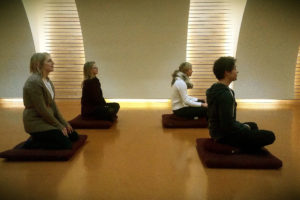Meditation has been shown to help us feel more connected, but what if it actually changes how strangers perceive us? New research from the Center for Healthy Minds explores this question through a unique study using still photographs.
Recent findings published in the journal PLOS One suggest that long-term meditators may actually be perceived by strangers as less neurotic, more mindful, more conscientious and more comfortable in their own skin.
Researchers at the Center were curious if naïve observers perceive differences between people who have practiced meditation and those who haven’t. How people perceive us, particularly strangers, has an impact on our interpersonal interactions. By having people rate a person based on a photograph alone, we can see if there are differences in how people may be viewed interpersonally.








